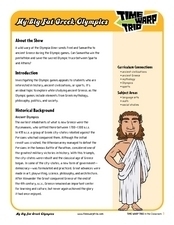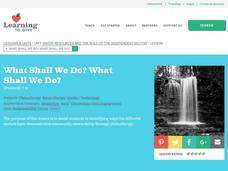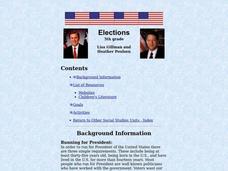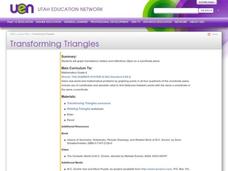Curated OER
Registering to Vote
Eighth graders register to vote. For this registration lesson, 8th graders complete the first step of the voting process by completing a form. Students use this lesson to prepare for a mock election. The lesson is part of a unit.
Curated OER
The Bill of Rights
In groups, learners review one of four selected Supreme Court cases. The whole class watches a video introducing the four cases, and then small groups dive into Internet research in an attempt to write a two-paragraph summary of the...
Time Warp Trio
My Big Fat Greek Olympics
The Olympic Games are indeed a significant and far-reaching cultural component in our international community today, but from where do they originate? Where do our traditions stem from, and how do we choose the sports that constitute...
EngageNY
Tax, Commissions, Fees, and Other Real-World Percent Problems
Pupils work several real-world problems that use percents in the 11th portion of a 20-part series. The problems contain percents involved with taxes, commissions, discounts, tips, fees, and interest. Scholars use the equations formed for...
Curated OER
Water Resources and the Role of the Independent Sector
Students explore how water conservation is influenced by the four sectors of economy. In this social studies economics lesson, students brainstorm problems and solutions related to water conservation. Collages are created to represent...
Curated OER
How the Community Meets Needs: The Drive
Students explore the four sectors of the economy. In this character development lesson, students experience giving up "their worldly possessions" and then discuss feelings that might occur when people experience homelessness or the...
Curated OER
Favorite Season Circle Graph
Pupils create a graph charting their favorite season. They discuss the difference in the four seasons and activities they participate in, in each of the seasons. They can also take a survey of their family members and add them to the graph.
Curated OER
What is a Community?
Young scholars explore the characteristics of their community. In this communities lesson plan, students read Humphrey the Lost Whale: A True Story and discuss how the community came together to solve a problem. Young scholars identify...
Curated OER
Art and Patriotic Culture
Art forms, especially government-sponsored "poster art", very effectively conveyed specific cultural values during World War II. Understanding the role that visual images play in expressing issues and ideas is critical to developing...
Curated OER
Separation of Powers: Connecting the Separate Powers
Students study the concept of separation of powers. They recognize how the Constitution provides for separation of powers and categorize public officials into one of three branches of government. Students do a role play and see if...
PBS
Universal Declaration of Human Rights
What rights are guaranteed to students? Do they align with the Universal Declaration of Human Rights, which was approved by the United Nations in 1948? Middle and high schoolers present persuasive arguments about the rights they believe...
Curated OER
THE JUDICIAL BRANCH
Students create a series of drawings to show the process of how the Supreme Court does its work. The drawings may be in strip cartoon form or a series of separate illustrations.
Curated OER
What would you do if faced with this problem?
Students determine how and why an individual from each of four disciplines - Buddhism, Taoism, Confucianism, and Legalism - might respond to the same problem.
Curated OER
Elections
Fifth graders examine the voting process, the electoral college and the voting process. They identify qualities important to a president. They fill out ballot sheets and study the registration forms.
Curated OER
Transforming Triangles
Sixth graders graph translations (slides) and reflections (flips) on a coordinate plane. They visualize and identify geometric shapes after applying transformations on a coordinate plane. Finally, 6th graders write a paragraph telling...
Curated OER
Digging for Dirt
Students examine how trash is removed and evaluate statistics related to trash removal. In this trash removal instructional activity, students explore the different methods of trash removal and make an original diagram graphing...
Curated OER
A Walk Through the 20th Century
Learners use primary and secondary sources to study the literature, historical events, people, technology, medicine, government, entertainment and culture of the decades of the twentieth century.
Curated OER
U.S. History: Virginia Assembly in America
Third graders discover the importance of the Virginia Assembly in English America as a governing body. After discussing the formation of the House of Burgesses, they elect their own representatives to make class decisions. In groups,...
Curated OER
Rome's Influence
Middle schoolers identify ancient Roman influences in the modern world. In this ancient Rome lesson, student research the government, religion, economy, inventions and contributions of Rome.
Curated OER
The Ides March On - Caesar Today
Young scholars make connections between the rule and reign of Julius Caesar and the leaders of other countries. They then create a news show that communicates their understanding of four essential questions that are included in the...
Curated OER
Four Seasons Class Mural
Students create a class mural showing them involved in different activities appropriate for the season they are examining. They describe the season they are examining and activities related to it. They practice using their listening and...
Curated OER
Representation: Majority rule
Students explore various forms of decision making including majority rule, executive, consensus and autocracy (as well as exploring the power of veto), when they debate a bill in a class parliament.
Curated OER
Classifying Monocot And Dicot Plants
Sixth graders identify the parts of a flower, and tell the difference between monocots and dicots. They group plant by leaf types and characteristics placing the information in table form on the computer.
Curated OER
Hammurabi's Code of Laws
Learners explore why the need arose for laws to govern society, comparing and contrasting hunter/gatherer societies vs. agrarian societies. They write letters to the editor of the Babylonian Times, discussing their opinion of Hammurabi's...

























